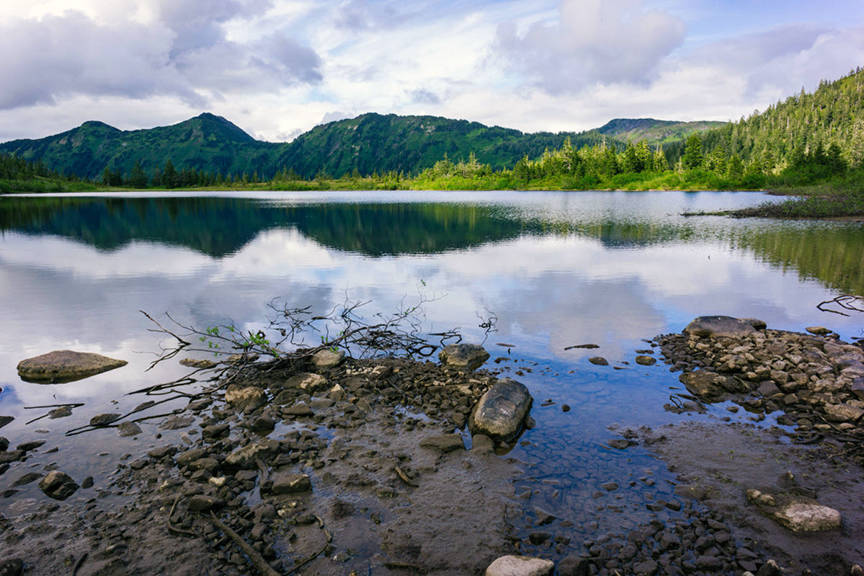Summary: Many of the questions posed to DEC were concerned with the state’s stewardship of the environment. All of the comments came from people who opposed the revisions and a majority of the speakers came from professional organizations or advocacy groups.
DEC staff maintained that changes to the state law were bringing Alaska in line with federal regulation and gave the state power to be able to guide applicants for variances. Critics say the changes will endanger the state’s water and public resources.
The public comment period for this proposal will end on Sept. 16 at 5 p.m. Additional public comment can be submitted in writing online or by mail.
6 p.m.
Hearing no additional comments, the meeting stands at ease. DEC representatives will remain on the line until 6 p.m. when the hearing officially ends.
5:24 p.m.
Shannon Donahue, representing herself, says she is concerned about the changes that the changes the state wants to make to water quality laws. She says that variance review occurs only every five years during which time irreversible damage to the environment could be done.
Giving the state discretionary powers over water quality regulations will endanger water quality in the state, she said.
5:20 p.m.
Phillip Moser says that water in Alaska is already polluted, that levels of micro-plastics in the water are already at intolerable levels. “We have the ability to just say no,” he says. He says he has no confidence in the federal government to protect the environment and that many companies have long track records of violating environmental regulations.
5:18 p.m.
Martin Stepetin Sr says the administration of Gov. Mike Dunleavy is very industry friendly, in many instances Alaska Natives have had to fight “tooth and nail” to obtain protections for sacred waters or subsistence grounds. He says that too often Alaska Natives are fighting lawsuits just to get the state to enforce existing laws.
5:11 p.m.
Bill Leighty, begins by endorsing Mr. Archibald’s testimony. He says that he is skeptical in any changes to regulations governing environmental protection coming out of the state government. He says that the “natural capital” of Alaska provides enormous economic benefit to the state and should not be threatened.
He says that he is additionally skeptical of any effort to emulate federal environmental regulation.
5:05 p.m.
Guy Archibald, a scientist for the Southeast Alaska Conservation Council says that his organization objects to the state’s proposal because they feel the state has failed to protect the state’s natural resources. In the past the state has allowed for business to undertake projects that caused harm to the environment without taking into account sufficient data on environmental impact, Archibald said.
The hearing is now moving to the public comment portion. Tabor says that he is no longer allowed to interact with the public during this portion.
5 p.m.
Tabor is asked how this law reconciles with the article in the state constitution which says that natural resources in the state be used for the maximum benefit of the public?
The Department of Law does a review of every state regulation but does not typically make its reviews public. Staff at DEC are not required to make a legal analysis because they are not legal experts, Tabor says.
Tabor is asked if at the five year review process the public is allowed to make comment.
While DEC is not required to take public comment in it’s five year review of each variance, federal law requires that public comment be taken every three years, Tabor says.
If after five years of a variance, an incremental improvement cannot be demonstrated by a discharger can DEC revoke the variance?
That would be specific to the individual variance, Tabor says.
Are there any waters that are “off limits?” For example, national parks or municipal water supplies?
The Environmental Protection Agency has not designated any waters as “off limits,” Tabor says, but is unlikely to approve a variance if it were to threaten critical water bodies.
4:35 p.m.
Tabor has received several questions about review processes and public comment on variances once they have been given.
Tabor said that because a variance is time limited, there would be a review process at least every five years but that additional milestones could be built into the variance. There are a number of review processes that can be implemented depending on a particular variance.
4:22 p.m.
Tabor is taking questions from the public, both in the room in Juneau and around the state via teleconference. Members of the public have asked Tabor about the motivation behind suggesting the changes as well as behind the changes in federal regulations.
Tabor has said that the federal changes were several years in the making and are meant to reflect modern business practices.
Tabor is also asked about the public notification process, whether the department made sufficient effort to reach out to members of the public.
Tabor replies that the notification for the meeting was released on August 1 and that several villages municipalities were reached out to before the meeting.
4:15 p.m.
The Alaska Department of Environmental Conservation is proposing a change to a code dealing with water quality standards. The Division of Water of DEC suggests an amendment to a state law which would allow DEC to authorize “water quality standard variances” in specific instances.
A WQS variance, according to a document from DEC, “provide(s) a flexible yet defined pathway for wastewater discharge permittees comply with state WQS.”
DEC is requesting this change because of changes to federal water regulations that took place in 2015 and the state is now updating its own laws to reflect those regulations, according to Division of Water Section Manager Brock Tabor.
• Contact reporter Peter Segall at 523-2228 or psegall@juneauempire.com.

